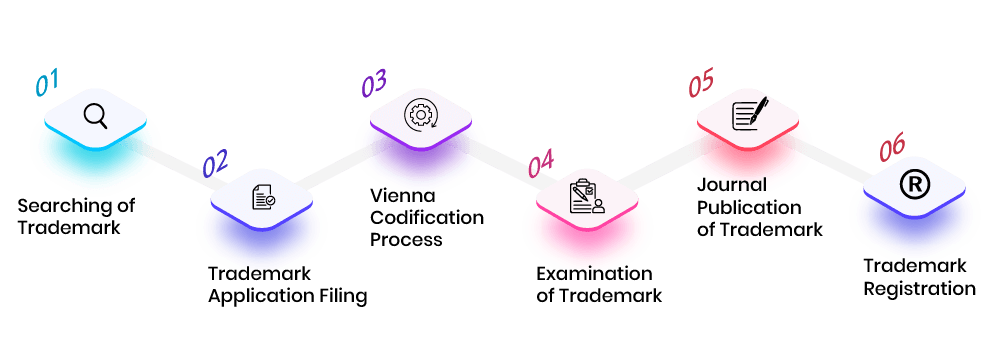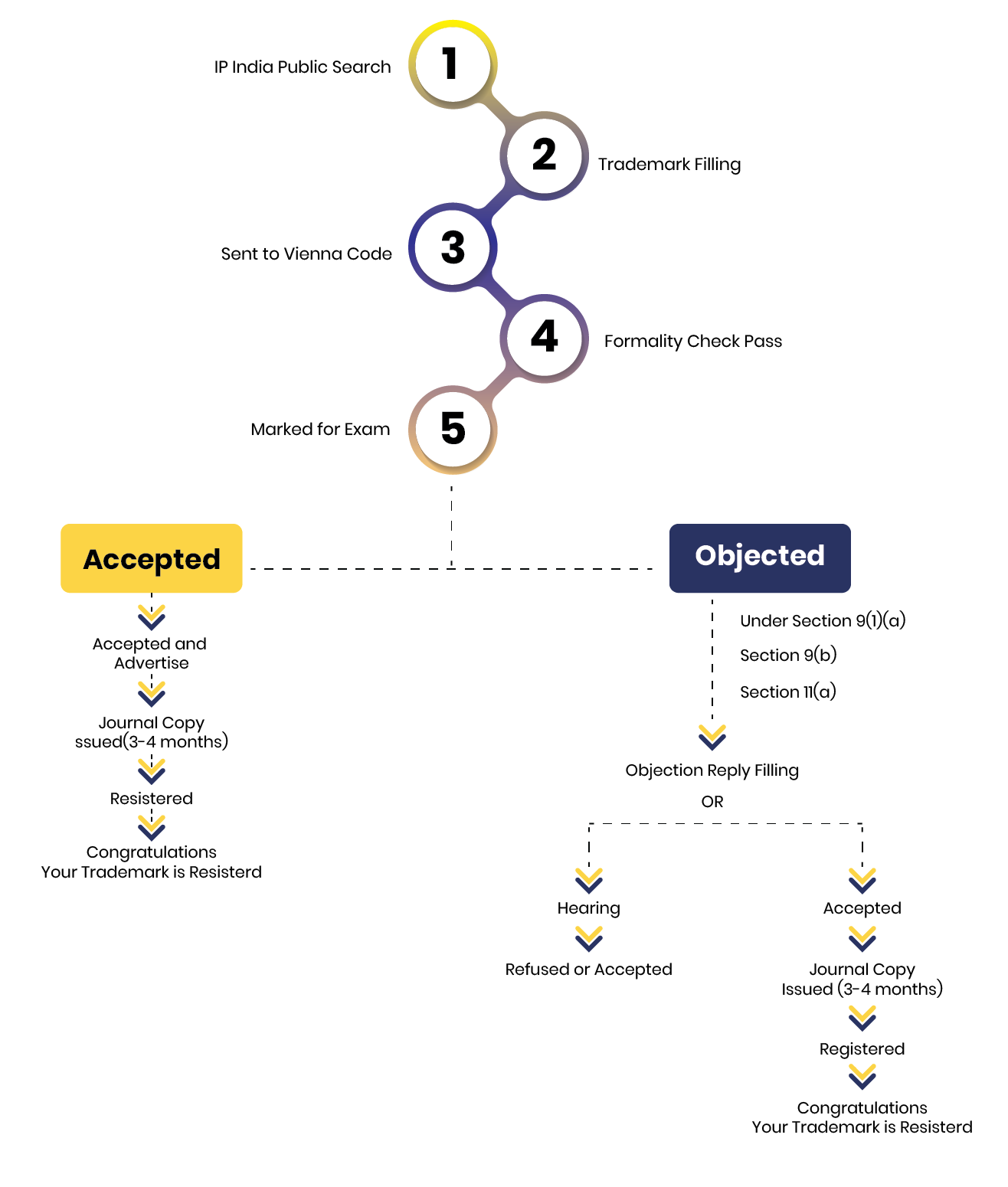🔒 Protect your brand with India's trusted Trademark Experts. Start your dream business with us!
Trademark Registration Online in India
At LegalTax, we specialize in simplifying complex legal, tax, and compliance processes for businesses of all sizes. Whether you're looking for company registration, trademark protection, tax filings, or ISO certifications, we provide expert services that ensure your business is fully compliant with Indian regulations.
Our dedicated team of professionals guides you at every step, offering tailored solutions to meet your unique needs. With LegalTax, you can focus on growing your business while we take care of all your legal and financial obligations, ensuring peace of mind and long-term success.
Get your Trademark Today
Our Application Process Trademark Registration in India

Overview of Online Trademark Registration in India
Trademark registration online is a vital legal process that provides businesses with exclusive rights to protect their brand names, logos, slogans, and other distinctive marks. Registering a trademark helps in establishing a unique identity for products or services, prevents unauthorized use by competitors, and allows the trademark owner to take legal action against infringement. With the advent of technology, the process of TM Registration Online has become more streamlined and accessible through online platforms.
The TM registration online process in India can be completed online through the Trademark Registration Online portal, which is operated by the Controller General of Patents, Designs, and Trademarks (CGPDTM) under the Ministry of Commerce and Industry's Department for Promotion of Industry and Internal Trade (DPIIT).
What is the Importance of Trademark Registration in India?
Trademark Registration in India holds significant importance for businesses and individuals alike. Here are some key reasons why trademark registration is essential in India:
- Legal Protection: Registering a trademark registration online in India provides legal protection to the owner by granting them exclusive rights to use the mark for the goods or services it represents. It helps prevent others from using a similar or identical mark, reducing the risk of infringement.
- Brand Identity: Trademarks play a crucial role in establishing and maintaining a brand's identity. It allows consumers to recognize and distinguish products or services associated with a particular business, leading to brand loyalty and goodwill.
- Business Reputation: A registered trademark enhances the reputation and credibility of a business. It signifies that the mark has met the required standards and has been officially recognized by the government.
- National Protection: Trademark Registration in India provides protection within the country's borders. It prevents others from using the registered mark for similar goods or services, strengthening the position of the trademark owner in the Indian market.
- Exclusive Use: Once a trademark registration online has been registered, the owner gains the exclusive right to use the mark for the goods or services it represents. This exclusive use helps in maintaining a competitive advantage and prevents others from riding on the brand's success.
- Legal Remedies: Online Trademark Registration provides a legal basis for taking action against infringers. In case of any unauthorized use or infringement, the trademark owner can seek legal remedies, such as injunctions, damages, and even criminal penalties in some cases.
- Licensing and Franchising: A registered trademark can be licensed or franchised to other parties, allowing the trademark owner to expand their business and generate additional revenue streams.
- Asset Value: A registered trademark is considered an intangible asset of the business and can add value to the company. In case of mergers, acquisitions, or sales, the registered trademark can have a positive impact on the company's overall valuation.
- International Protection: In some cases, an Indian company might seek to expand its business globally. Having a registered trademark in India can serve as a basis for seeking protection in other countries through international treaties and agreements.
- Avoiding Disputes: Trademark registration online reduces the chances of disputes with other businesses using similar marks. It helps avoid potential legal conflicts and costly litigation.
Online Trademark Registration Eligibility Criteria In India
The eligibility criteria for Online Trademark Registration in India are as follows:
- Applicant Eligibility: The applicant can be an individual, a company, a partnership firm, a society, a trust, or any other legal entity. The applicant must have a valid address in India or abroad. The applicant must also have an interest in the trademark, either as the owner or as a licensee.
- Trademark Eligibility: The trademark must be distinctive, meaning that it can distinguish the goods and services of the applicant from those of others. The trademark must not be descriptive, generic, deceptive, scandalous, or contrary to any law or morality. The trademark must also not conflict with any existing registered or pending trademarks.
- Goods and Services Classification: The goods and services for which the trademark is sought must be classified according to the Nice Classification system, which divides them into 45 classes. The applicant must specify the class or classes that correspond to their goods and services and provide a clear and concise description of each.
- Use in Commerce: The applicant must state whether they have used or intend to use the trademark in commerce in India or abroad. If the trademark has been used, the applicant must provide the date of first use and evidence of such use, such as invoices, labels, brochures, etc. If the trademark has not been used, the applicant must declare their bona fide intention to use it in the future.
- Power of Attorney: The applicant must appoint an agent or attorney to act on their behalf for the trademark registration Online process. The agent or attorney must be registered with the Trademark Registry and have a valid address in India. The applicant must sign a power of attorney form and submit it along with the application.
- Documents and Information: The applicant must provide various documents and information for the Online Trademark Registration process. These include:
- A trademark application form (TM-A) with the prescribed format
- A clear representation of the trademark in JPEG format
- A statement of claim of distinctiveness or prior use (if applicable)
- A translation or transliteration of the trademark (if not in English or Hindi)
- A priority claim document (if claiming priority from an earlier application in another country)
- A user affidavit (if claiming prior use)
- Any other document or information as required by the Trademark Registry
Documents Needed For Trademark Registration Online In India
If you want to register a trademark in India, you need to submit some documents along with your application. These documents are essential to prove your ownership and use of the trademark, as well as to avoid any objections or oppositions from other parties. Here are the documents you need for Trademark Registration in India:
- Trademark Application Form: Form TM-A from the Indian Trademark Office website or physical office.
- Applicant's Details: Name, address, nationality, and legal entity details if applicable.
- Trademark Representation: Wordmark, logo, device mark, or combination.
- Trademark Class: Class or classes based on the Nice Classification system.
- Power of Attorney: Signed document authorizing a trademark agent/attorney.
- Proof of Claim: Invoices, bills, advertisements proving prior use.
- Priority Document: If claiming priority from another country.
- Government Fees: Prescribed fees based on applicant type and number of classes.
- User Affidavit: Affidavit stating usage of the trademark if applicable.

Process For Trademark Registration Online
If you want to register a trademark online, you need to follow these steps:

- Trademark Search: Check the availability of your mark using the IP India database.
- Determine the Trademark Class: Identify the correct class(es) for your goods/services.
- Create an Account: Sign up on the IP India portal with basic details.
- Complete the Application Form: Fill TM-A with trademark name, class, owner details, declaration of use, and image upload.
- Submit the Application: Review, submit, and pay the required fees online.
- Examination and Publication: The application is examined for legal compliance and published in the official gazette if approved.
- Opposition Period: Third parties can file oppositions; the applicant can respond.
- Trademark Registration Certificate: If successful, the certificate is issued proving exclusive rights.

Trademark Objections
Objections are raised by the examiner during the examination stage on grounds like lack of distinctiveness, similarity, or descriptiveness. Applicants can respond with arguments or amendments.
Trademark Opposition
Oppositions are filed by third parties after publication. Grounds include prior rights, bad faith, confusion, or non-use. Both parties present evidence before the trademark office decides.
How Someone Can Check Trademark Application In India?
- Visit https://ipindiaonline.gov.in
- Log in or register as a new user.
- Select "View Your Applications/Registrations" under "My Portfolio".
- Click on the application or trademark number to view details.
- See status, examination reports, opposition, hearing, certificate, renewal, etc.
- Alternatively, use "Trademark Application/Registered Mark Status" under "Public Search" without logging in.
Benefits Related To Trademark Registration Online
Online Trademark Registration protects brand identity and reputation. Benefits include:
- Legal Protection: Exclusive rights to sue infringers.
- Recognition: Build a distinctive brand image and increase trust.
- Business Expansion: License or franchise to create revenue streams.
- Prevention of Confusion: Avoid consumer confusion and disputes.